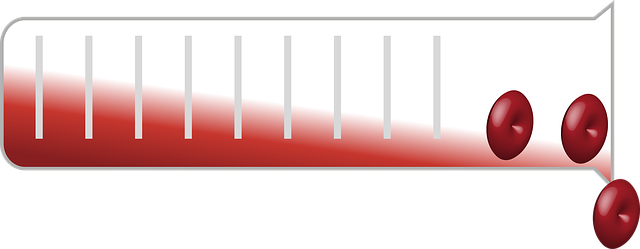Cholesterol blood tests are vital for heart health as they detect levels of 'good' HDL and 'bad' LDL cholesterol, helping to prevent plaque buildup and reduce the risk of heart disease and stroke. Optimal HDL (60 mg/dL or higher) and low LDL (below 100 mg/dL) levels are key. Regular testing, along with a healthy diet and exercise, enables proactive management of cholesterol levels, ensuring long-term cardiovascular health. Pre-test preparation includes dietary consistency, avoiding high-fat foods, and arriving well-rested for accurate results.
Maintaining optimal heart health starts with understanding your cholesterol levels. This comprehensive guide delves into the significance of a fast and accurate Cholesterol blood test, outlining why it’s crucial for early detection and management of cardiovascular risks. From unraveling the complexities of cholesterol to offering practical tips for preparation and interpreting results, this article equips you with knowledge to actively engage in preserving your heart’s well-being. Discover how regular cholesterol blood tests can be your powerful ally in maintaining a healthy heart.
- Understanding Cholesterol: What It Is and Why It Matters for Heart Health
- The Importance of Accurate Cholesterol Blood Testing
- Preparing for Your Cholesterol Blood Test: Tips for Fast and Reliable Results
- Interpreting Cholesterol Levels: What Do the Numbers Mean?
Understanding Cholesterol: What It Is and Why It Matters for Heart Health
Cholesterol is a waxy, fat-like substance found in all cells of our bodies. While often talked about as if it’s a single entity, cholesterol actually consists of several types, with HDL (high-density lipoprotein) and LDL (low-density lipoprotein) being the most well-known. HDL cholesterol is often referred to as ‘good’ cholesterol because it helps remove excess LDL cholesterol from your bloodstream, which is considered ‘bad’ cholesterol. High levels of LDL can lead to a buildup of plaque in your arteries, increasing the risk of heart disease and stroke.
Regularly getting a Cholesterol blood test is crucial for maintaining optimal heart health. This simple procedure measures the amount of cholesterol in your blood, allowing healthcare professionals to identify high levels of LDL or low levels of HDL that might put you at risk. Early detection enables timely intervention through lifestyle changes or medications to reduce cholesterol levels and protect your cardiovascular system.
The Importance of Accurate Cholesterol Blood Testing
Maintaining optimal heart health is a cornerstone of overall well-being, and one of the key indicators in this regard is cholesterol levels. This waxy substance, found in every cell in your body, plays a vital role in various bodily functions but can become problematic when its amounts in the blood are off balance. A fast and accurate cholesterol blood test is, therefore, an essential tool for navigating heart health.
Regular cholesterol testing allows individuals to identify elevated LDL (bad) cholesterol or low HDL (good) cholesterol levels early on, empowering them to take proactive measures. These actions might include adopting healthier diets, incorporating regular physical activity, or even considering medical interventions. By addressing high cholesterol promptly, folks can significantly reduce their risk of cardiovascular diseases, ensuring a robust and healthy heart for years to come.
Preparing for Your Cholesterol Blood Test: Tips for Fast and Reliable Results
Preparing for your cholesterol blood test is key to ensuring fast and reliable results. First, maintain a consistent diet leading up to the test day. Avoid eating foods high in fat or cholesterol 24 hours before the test, as this can impact readings. Opt instead for balanced meals rich in whole grains, fruits, and vegetables.
On the day of your test, remember to bring your identification and any forms provided by your healthcare provider. Arrive at the lab well rested; sleep deprivation can affect cholesterol levels. Avoid strenuous exercise immediately before the test as this may also influence results. Relax and trust that you’ve done everything possible to ensure an accurate reading for optimal heart health.
Interpreting Cholesterol Levels: What Do the Numbers Mean?
Cholesterol levels in your blood are a critical indicator of your heart health. A cholesterol blood test measures two main types: HDL (high-density lipoprotein), often referred to as ‘good’ cholesterol, and LDL (low-density lipoprotein), or ‘bad’ cholesterol. Optimal levels for HDL are 60 mg/dL or higher, while ideal LDL levels stand at below 100 mg/dL. Elevated LDL can lead to plaque buildup in your arteries, increasing the risk of heart disease and stroke. Conversely, higher HDL helps remove LDL from your bloodstream, thereby reducing these risks.
Understanding these numbers is crucial for navigating optimal heart health. A cholesterol blood test provides a snapshot of your current levels, guiding lifestyle adjustments or medical interventions if necessary. Your healthcare provider will interpret the results in the context of other risk factors, such as age, family history, and blood pressure, to offer personalized advice on managing cholesterol levels effectively.
A fast and accurate cholesterol blood test is a powerful tool for maintaining optimal heart health. By understanding your cholesterol levels, you can make informed decisions about your lifestyle and diet to mitigate risks. Regular testing, combined with expert interpretation, enables proactive care, ensuring your heart remains healthy in the long term. Remember, knowledge is the first step towards preventing cardiovascular issues, so take charge of your heart’s well-being today.
